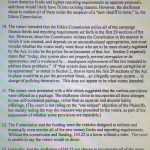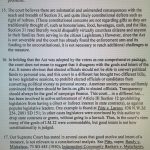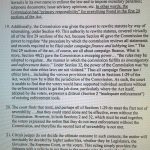Judge Mark Barnett ruled yesterday that his injunction against enactment of Initiated Measure 22, the Anti-Corruption Act, stands against the entire law. Judge Barnett thus rejected the state’s severability argument, which sought to lift the injunction from 28 sections not yet deemed unconstitutional by the court.
Here is Judge Barnett’s six-page ruling (well, five pages and a signature):
Judge Barnett does not address the fact that the sponsors included a severability clause in their original draft of the initiative and removed it only on the recommendation of Legislative Research Council director Jason Hancock, who wrote in a July 29, 2015, letter, “Severability clauses may be used in other states; however, severability is a long-established doctrine of the South Dakota Supreme Court” and the severability clause sponsors include in the draft submitted to his office “should be deleted.” Judge Barnett does not dispute that constitutional sections could “stand alone and be effective” even without IM 22’s unconstitutional ethics commission [p. 5, parag. 20]. However, Judge Barnett contends that “I.M. 22 was presented to the voters as a self-contained, comprehensive package of reform” [p. 2, parag. 5] and that voters thus would not have voted for any of the new campaign finance limits without the new ethics commission to enforce them.
*****WARNING to Sensitive Readers: Reporting Ends—Rebuttal Begins!*****
Judge Barnett’s argument is shaky at best. First of all, he cites no evidence that voters intended an “all or nothing” outcome. Judge Barnett uses phrases like “voters believed,” “one must assume,” and “This does not appear to be what voters intended.”
Judge Barnett then resorts an incomplete reading of IM 22. Let’s start with paragraph 8, where he says overturning the Democracy Credits program requires that he also throw out IM 22’s general campaign finance limits:
When voting, in part, for public funding of campaigns, one must assume that the voters saw that public funding as a way to lessen the influence of “non-democracy credits” or private sector funds flowing into campaigns. in other words, as the voters tightened money from the private sector, via donation limits found in the first 29 sections of the Act, they also created funding from the public sector, in Sections 32–68. This suggests once again that the entire scheme was one package… one comprehensive way to get private money out, and public money in, to campaigns. Under the act, candidates would be steered away from private funding and made dependent on public funding [emphasis original; Judge Mark Barnett, Order on Severability, Curd et al. v. South Dakota, #32CIV16-000230, p. 2, parag. 8].
That paragraph leaves me wondering if Judge Barnett is reading the same IM 22 as I am. IM 22 did not seek to steer candidates away from private-sector funding. Section 53 requires candidates to obtain private funding before they can qualify for public funding. Section 59 limits the amount of public funding qualifying candidates can receive. IM 22 places no comparable limit on the amount of private funding that any candidate can receive, only on the amount that a candidate can receive from a single source. IM 22 does not mandate participation in public campaign finance; thus recognizing that candidates could choose to continue business as usual, IM 22 thus included provisions to change that business as usual.
I contend it seems more logical, looking at what IM 22 actually says, that voters intended to enact two reforms: first, a nice little voluntary public campaign finance system to encourage candidates to seek more small donations, public and private, in order to connect with more voters; and, second, a tightening of existing campaign finance limits to check the corrupting influence of big money. Even if the public financing system was a complete bust—either because no candidate participated or because some judge threw it out—we’d still have reforms that would apply to every candidate.
Judge Barnett says it’s not just his blocking of Democracy Credits that requires him to enjoin the campaign finance limits; it’s also his annulment of the ethics commission. See paragraphs 9 and 10:
The voters agreed to make the Commission independent of the rest of state government…. Thus, the voters expressed a distrust of all existing state offices to enforce all of the new duties and prohibitions set forth in the first 29 sections of the Act.…
The voters intended that the Ethics Commission police all of the campaign finance limits and reporting requirements set forth in the first 29 sections of the Act. However, since the Commission violates the Constitution in the manner in which it was created, and depends on an unconstitutional appropriation, one must wonder whether the voters really want those who are to be more closely regulated by the Act, to also be the police for enforcement of that Act…. If “that system does not properly prevent corruption or its appearance” as state in Section 2, then to leave the first 29 sections of the Act in place would be to put the proverbial foxes… and allegedly corrupt system… in charge of policing themselves. This does not appear to be what voters intended [emphasis original; Barnett, 2016.12.21, p. 3, parags. 9–10].
Again, Judge Barnett appears not to be reading IM 22 Sections 24–27:
Section 24: That § 12-27-29.1 be amended to read as follows:
12-27-29.1. In addition to any other penalty or relief provided under this chapter, the secretary of state or the ethics commission, after notice and opportunity for hearing pursuant to chapter 1-26, may impose an administrative penalty for the failure to timely file any statement, amendment, or correction required to be filed by this chapter….
Section 25: That § 12-27-35 be amended to read as follows:
12-27-35. The attorney general shall investigate violations of the provisions of this chapter
relating to a legislative office, statewide office, or statewide ballot questionand prosecute any violation thereof….Section 26: That § 12-27-36 be amended to read as follows:
12-27-36. The attorney general and ethics commission may, for the purpose of enforcing the provisions of this chapter, inspect or examine any political committee or political party records required to be maintained by this chapter….
Section 27: That § 12-27-37 be amended to read as follows:
12-27-37. The attorney general and ethics commission shall keep each record inspected or examined confidential except when the records are used to enforce provisions of this chapter associated with a criminal or civil action….
These four sections add investigation and enforcement authority to the ethics commission while leaving in place authority of the secretary of state and attorney general. Furthermore, Section 39(4) allows the ethics commission to investigate violations of IM 22 itself or “refer the matter to the secretary of state or the attorney general, as appropriate….” Voters reading and approving that text didn’t discount the possibility of our foxy SOS and AG doing their duties, but in case the SOS and AG don’t, voters created one more agent of accountability. IM 22 voters didn’t throw away their belts; they just put on suspenders.
Judge Barnett says, “Without the commission and funding, I.M.22 is a horse without a rider. The court is unable to say the voters would so direct” [parag. 12]. But Judge Barnett could read the text of IM 22 and see the voters did not so direct. They didn’t make all of their desired reforms depend solely on Democracy Credits and the ethics commission. They created new campaign finance limits, restrictions on shell committees used to evade contribution caps, new limits and reporting requirements on independent communications, an extension of the lobbyist revolving-door sit-out period, and an increase in the legal penalty for bribes and threats to influence legislation and legislators, most of which Judge Barnett does not mention (his order focuses on campaign finance) and all of which IM 22 allows to be enforced by existing mechanisms.
To justify his refusal to sever IM22 and allow certain provisions to stand, Judge Barnett has ignored legal precedent and conjured a voter intent unsupported by the actual text that voters read and approved. Attorney General Jackley, we trust you’ll appeal this order to the Supreme Court, beat down this injunction, and restore to law at least some of what we the voters wanted.






CH,
I think there are so many subjects under the one-subject law, Barnett would have been forced to pick only one which runs contrary to the “package” the advocates said it was. A Judge’s job is not to pick the “most important” or “most central” etc. component of this bill. Plus the severability principle is in place to delete unconstitutional components not critical to the rest of the bill. How can he really discern which of these separate subjects weren’t critical? It would require him to read the collective mine of the people who voted on it.
It’s nice and helpful that you are doing this reason-based analysis Cory, but making sound legal arguments is hardly what any of this about. Judges are political actors and certainly Mark Barnett is even more so than your typical judge. He wasn’t going to rule in any direction except one that advances his political ideals and conforms with what his peers expect.
Brett; my uncle taught me that judges are politicians in a robe – especially in a 1- party state lacking legislative judicial oversight. The opinion’s reasoning amply shows why the author’s judgment, as a candidate for governor, received the voters rejection.
While I have deep respect for Mr. H’s legal opinions, I still find it somewhat amusing to watch this play out and imagine Slick Rick sitting on his fancy couch laughing as he smokes expensive cigars and sips cognac. And then if these fellows complain that this L.R.C. outfit told them to take a clause out so they did, but then realize that the same L.R.C. outfit told them it was unconstitutional and they ignored it? I wish I had an expensive cigar and glass of bourbon to sip while I enjoy that. I am not as fancy as Slick Rick who hoodwinked the taxpayers*.
*It is only grudznick’s opinion, but these taxpayers are mostly stupid. This IM #22 bears it out.
Jackley never has struck me as fair and impartial in his decisions of whom to throw the book at. No warm and fuzzy feelings from this guy at all. Krebs is somewhat different, but a lot of that could be chalked up to her looks. Ask GravyTaters Grudz. He is the house expert on rating women’s looks.
Mr. Mike, I realize you are from Iowa and probably don’t know that Ms. Krebs is actually one of the plainest looking Ms. South Dakotas that have held that crown over the past 50 years. You might think she’s pretty, but I don’t think she holds a candle to Dr. Bos.
I am sure Ms. Krebs is, by Iowa standards, a goddess.
It appears Judge Mark Barnett has not heard the people speak loud enough so let’s turn up the volume.
If some of the remaining sections are not severable in this instance, then I can’t imagine an instance where severability would apply. The law is criticized for tackling too many separate subjects and simultaneously attacked for having subjects that are inseparable. Darned if you do and darned if you don’t.
Then voters are accused of being hoodwinked and their intent not met by IM22 at the same time the voters intent is claimed to be known completely by one circuit court judge. It seems there are a lot of contradictions going on here.
Mr. Larson, it was a very sloppily drafted law bill. Sloppier than almost any ever. And then all the out-of-state money hoodwinked the ignorant taxpayers into coughing up another $5 million dollars a year to give to these same politicians.
Grudz, how can a guy you call slick submit a sloppy bill? You can’t be slick and sloppy at the same time. If the bill is just sloppy, then why isn’t the governor and the legislature vowing to correct any deficiencies and carry out the will of the people. The reaction of the Republican establishment looks like somebody is afraid of oversight and accountability. They have had more than enough time to come up with a legislative solution, but ethics, accountability and oversight were not on their radar.
Slick Rick is slick. The bill was sloppy. Clearly sloppy and unconstitutional. Rick slickly tricked the ignorant voters by lying to them.
That makes Slick Rick slick.
That makes the bill sloppy and unconstitutional.
Judge rules!
Judge rules!
Troy, your last sentence is my problem with this ruling. Judge Barnett pretends to read the minds of the voters when he does not need to. All he needs to decide is what’s constitutional and what isn’t. Severability is already an established principle. LRC said so and told the drafters, delete your severability clause; you don’t need it. Enacting the clauses Jackley asked for, clauses on which no constitutional opinion has been rendered, creates no crisis—constitutional, fiscal, practical, or gustatory (i.e., legislators can still eat all the free sandwiches they want) or absurd result. The only reason Judge Barnett gave for not exempting Sections 1–12, 14–18, 21–23, 28–30, 64-67, & 70 from his injunction was his assumption of the voters’ intent, which relied more on bad mind-reading and bill-reading than on the actual text of the meat of the sections in questions.
Ask a silly question, get a silly answer.
Brett—aaaaaccck! How can this not be about making sound legal arguments? Where the heck are living, Pinochet’s Chile?
Hey, let’s not let Grudznick derail a discussion of the legal argument here with his irrelevancies. As is far too often the case, Grudz wants to make his cutesy personal jibes instead of dealing with the serious issues at hand.
Mark, I welcome your suggestions for turning up the volume.
Darin, the line we may need to repeat over and over is that one activist judge overturned the will of the people. The proper response of the Legislature is to restore the will of the people. Responsible legislators would immediately submit and pass 2017 HB 1, a measure to enact all provisions of IM 22 not direct deemed unconstitutional by Judge Barnett’s injunction. The 52% of South Dakotans who voted for IM 22 should start calling legislators now.
The legal facts here, Mr. H, are more than half of this law bill has been found unconstitutional which makes the whole thing garbage. And the draftsmen were told it was going to be unconstitutional, but they didn’t change it or fix it, they just greedily plowed on.
Now it is all moot. The bill is in limbo and has no effect. The courts will eventually pull its plug. And the legislatures will do this stuff right without input from the out-of-state interests or the people who engorged their wallets (Mr. Weiland) while foisting this defrauding hoax on the public of the Great State of South Dakota.
The State of South Dakota notwithstanding. South Dakota, highest in standing instrument, Organic Constitution Article 6 chapter 26 and it reads All political power is inherent in the people, and all free government is founded on their authority, and, is instituted for their equal protection and benefit, and they have the right in lawful and constituted methods to alter or reform their form of government in such manner as they may think proper. And the State of South Dakota is an inseparable part of the American Union, and the constitution of the United States is the supreme law of the land.
The fox is deciding if it is lawful for itself to guard the chickens. The vote is the order it cannot be adjudicated and judged. This is the same as a Jury trial it cannot be overturned. Wake up the voters are the highest court, its done period. Since when did the inferior courts overrule the highest court? The United States Supreme Court cannot change the peoples order. DUH.
Kopecky
-your comment is probably the most “On Point” of whole discussion! This “judge” of ‘voter’s intent’ is as far away from the truth of the matter as anonymous Grudz is and he is a chronic GOP denier of basic truths and wisdom. Ask any voter in SD if they want a fox or coyote to guard their hen house and you know the answer–but 40 yrs or more of GOP in our state has left us with ‘judges’ like Barnett who simply are extended versions of the potty-bill hatred mentality of the legisature..
CH,
1) I must not have made my point clear: If there are three subjects in the bill which are constitutional but the three in the one IM violate the “one-subject” clause, which one is Barnet supposed to discern to allow to stand? That is what I meant by having to read minds on what is most important.
2) The whole point of a judiciary of a third branch is to interpret the law no matter how loud the public is screaming. The public’s recourse is to change the law via the legislative process and not yelling for judges to respond.
Time for my “Dynamic Website” pitch again.
We need websites for every Government department that shows every purchase order, contract, and expenditure made. Sorting low to high, high to low, by department, and by level of Government we could see all of our tax dollars.
Cabellas does it, Sheels does it. They cannot imagine business without the ability to keep track of spending, sales, and inventory. Why should Government be any different if they truly wish to be accountable to their stockholders?
Rapid City Schools did not want to pay someone 30K per year to maintain boilers, so they could find no one to fill the open position. Instead, they negotiated a contract with Johnson Controls for an $11K per month retainer, plus costs if a repair person is called. To those who will counter with: “the expenditure is in the newspaper notices”, Yes, it is. One sees a payment to Johnson for $11k every month and most people would assume it was for a broken boiler, but it is not. The notices do not not tell the whole story of them spending $100K per year more than needed, and more importantly, $100K more than any of us would, and there are countless other similar wastes of money for no good reason in every Government office.
Do the other HVAC companies in the area know about this sweetheart deal? They would if everything was on a Dynamic Website, and then we would have competition to set the price. Sunshine will cure corruption and nepotism.
Barry,
I agree there is merit with regard to what you describe. But, implementation isn’t quite as simple as you infer but working toward such a data engine (so much more than a website) should occur.
Regarding your description of what happens at RC schools doesn’t seem either out of the ordinary or expensive and it certainly isn’t likely corruption or nepotism. I don’t know how many schools RC has but my parish which has a school just completed a replacement of its heating & cooling system and has a similar arrangement (retainer plus service fee) with a similar company. The new technologies which minimize electricity/gas consumption to efficiently move air and maintain temperatures are so sophisticated it takes a person with very specific technical skills.
The bigger issue you describe in my mind is if RC still has boilers they may be at least two generations removed from more efficient technologies and should be upgrading (granted retro-fitting old buildings may make upgrades cost prohibitive as we were lucky half our school was relatively new). We upgraded our system at our parish in part in the late 1990’s and the energy cost savings more than paid for the upgrade. In retrospect, we’d have been wiser to do a complete upgrade. What our parish did was a complete upgrade and it is expected this will be fully paid for in savings in I think 7 years with the hope of getting 13 years of “free cash flow.”
Instructing that severability be removed from the IM because of redundancy, when leaving severability in the IM would have caused nothing more than a half-cent of ink is corruption in true South Dakota fashion. It was a scandalous sabotage worthy of high disdain for LRC’s Jason Hancock.
The same Governor and crew who claim voters were ignorant and stupid when the voted for ethical government and their will can be ignored, then turns around and says voter will supporting Trump must be obeyed.
The whole world would not end if the reform was used as passed by voters to see what happens. If terrible problems result, then amend what does not work.
Mr. Lansing is righter than right. The L.R.C. does have a recent history of ineptitude and corruption. It could have been Mr. Handcock’s ineptness or it might have been a nefarious action in collusion with the one-party rule. But it has to be one of those things unless he was correct.
Sin sala bim
The Blindman
Grudz could be correct. If severability is already assumed in the IM, then the judge just screwed up. Judging (pun intended) by some of the lawyers who post on political blogs in SoDak (who are absolutely certain about what they know but fail to realize that what they know is certainly wrong), the state’s pool of judgeworthy talent is as weak as Salvation Army chicken broth.
Grudz: Show all the rest of us constitutionally illiterate people exactly where the Supreme Court has ruled that 1/2 of IM-22 is unconstitutional…….. You can’t because the SD Supreme Court has yet to grant certiorari to hear this case much less rule that any or all of it is “unconstitutional”! A district judge did not rule on Constitutionality. He ruled on a stay to prevent the law from going into effect. That is all. Period. End of discussion. The SD Supreme Court is the only body that can rule on constitutionality questions and even then, their rulings can be appealed to the US Supreme Court. You deal in absolutes and there aren’t any! Learn something about the judicial process and constitutional declarations before you start laying all that fictional, rhetorical vomit on the rest of us.
Mr. W, got your goat, dinit?
It’s unconstitutional. Mark my words.
John & Grudz,
My understanding is Barnett’s ruling is a permanent injunction which prevents it from going into effect for constitutional reasons. Isn’t that the same thing as ruling it unconstitutional? If not, effectively it is a distinction without a difference.
Second, it is my understanding, if the advocates for IM22 appeal to the SD Supreme Court, they can affirm the decision or overturn it in whole or part.
Thus, it is my understanding a district court can rule something unconstitutional but the matter can be appealed to the US Supreme Court.
Finally, it is my understanding the US Supreme Court is unlikely to hear an appeal of a ruling of a State Supreme Court on an interpretation of a state constitution unless there is an assertion the state constitution or the ruling violates something in the US Constitution (an assertion I’ve never heard made with regard to IM22). The SCOTUS isn’t the final judge on interpretation of the State’s Constitution.
If there is something wrong in my understanding, please illuminate me. If there is nothing wrong in that understanding, it is pretty absolute.
Troy’s right. The Dark Side has won, on a technicality. The people’s desire for an anti-corruption package has fallen to an override by the corrupt. Republicans have the numbers to impose their will on the people.
Mr. Jones is indeed right. The judge ruled that more than half of the IM #22 was unconstitutional. Then the judge snorted a bit and hit his hammer on the table. It’s been ruled unconstitutional. If people don’t like that they have to appeal it to some other place where it will be ruled double unconstitutional, I am quite sure.
Just because you disagree with somebody, Mr. Lansing, doesn’t mean they are not correct.
Judge rules!
Troy, review paragraph 11. Judge Barnett says he is not ruling on the plaintiffs’ one-subject argument. Your point does not figure anywhere in Judge Barnett’s ruling.
I agree that the judiciary’s job is to read the law and the constitution, not debate with the public. However, since those controlling the Legislative branch initiated this lawsuit and thus appear to have no desire to enact the voters’ will, the only hope for IM22—or at least the constitutional and severable portions thereof—is to prove to the South Dakota Supreme Court that Judge Barnett erred. If A.G. Jackley needs help proving that point, I invite him to borrow liberally from this blog post.
Porter, remember that Hancock has only been here for 2.5 years. He may not have been here long enough to really soak in the corruption. I’m not convinced he was engaged in sabotage. It seems more likely he was giving a straight answer, as LRC usually does, and that Judge Barnett has crafted the response his Republican friends want by working around that solid legal advice from LRC.
Mr. H, if Mr. Hancock was not tricking these fellows who slapped this IM #22 together, why did they listen to him when he said take out this one part but they ignored him when he told them to take out the parts that are now being declared unconstitutional by the judge? Solid legal advice from the LRC would have been to listen to the part where the LRC said “that is likely unconstitutional” but no, they ignored that.
I think Mr. Hancock tricked Mr. Wieland and friends, and tricked them good. Or he’s inept. There is no middle.
To be clear, in his Order Granting Preliminary Injunction issued alongside the above Order on Severability on Wednesday, Judge Barnett said, “Plaintiffs’ arguments on constitutionality of IM22 are likely to succeed on the merits.” In paragraph 1 of the above order, Judge Barnett says, “The court has previously ruled that the Ethics Commission, the Democracy Credits, and the appropriation therefor, all violate various provisions of the South Dakota constitution.”
Mr. Gru … Judge’s rulings are never right or wrong. They are opinions, sir. That one believes an opinion can be either right or wrong is also “just an opinion”.
You all must remember that if this Mr. Hancock fellow was hired just a few years ago he was hired by the legislatures run by the powers you hate. It would have been all Republicans who pulled the strings on firing the old guy and hiring the new guy, because I heard the old guy was more sympathetic to the minorities party. I think you will find these fellows all eating free hot dogs during the legislatures this year, and Mr. Nelson stuffing his maw as the likely eating champ.
Thusly my point Mr. Lansing and Grudz: Barnett’s ruling is his opinion. His opinion is that parts of IM22 are unconstitutional. On appeal, his opinion can be over ruled and the rule of law arises out of the dictum (opinion) The Supreme Court opinion makes it right or wrong. Grudz is still wrong in that the constitutionality of IM-22 or it’s parts remains an open question on appeal. All Barnett did is say that the measure can not be applied due to constitutional questions yet unanswered authoritatively. If proponents of the measure appeal, which they will, Supreme Court in SD has the final say. If their decisions conflict with previous US Supreme Court rulings in other similar state cases on the basis that interpretations of the State Constitution do not flatter the US Constitution, the matter can be appealed. There is no guarantee that the US Supreme Court will grant certiorari but they can at least review the arguments. This thing is far from over and I don’t trust Grudz as far as anybody can throw him. IM22 was put together using case law and precedent from other states and it passed constitutional muster in those states. Our state constitution is not that much different than others.
That LRC advice is binding………… It’s good evidence that will be persuasive on appeal.
CH,
Read paragraph 11. You make a good point he is not ruling on whether the “package” violates the one subject rule but hints in his mind it does. Thus, I think it means he put an injunction on the entire bill and has kicked it up to the Supreme Court to make a definitive ruling on that matter.
My question is for the lawyers: If the Supreme Court rules there are multiple components which are Constitutional but together they violate the one subject rule, how does the Supreme Court pick which one to allow to become effective? Or, because the IM has multiple subjects, do they throw the entire thing out?
My second question for the lawyers is: What exactly is the principle of severability? My understanding is it allows a non-integral section to be thrown out because it violates the Constitution if the remaining portion is sufficient to do what the authors intended. If the part thrown out makes the bill not workable as intended, the entire thing gets thrown out.
Troy, if the circuit court does not rule on the one-subject issue, can the Supreme Court consider the one-subject issue in the appeal?
If the one-subject argument comes up and prevails for the plaintiffs, I would suspect it means the court throws the whole thing out. If a law is passed by invalid means, we don’t get to keep any part of it.
The principle of severability seems pretty clear. Judge Barnett says in paragraph 3 that both sides agree on two basic tests: “can the remaining valid portions function effectively without the invalid portions,” and “would the voters have intended to pass the remaining portions without the invalid ones”? Judge Barnett bases his blanket injunction entirely on the latter.
I was reading what Mr. Epp, that straight lawyer from Harrisburg who now must work for Mr. H’s friend Mr. Belfrage, said about Marsy’s law:
“Thanks for nothing, voters! Read the &*^)@ measure better next time.”
I had to laugh and laugh because that’s the same thing everybody needs to say to the stupid voters who voted for the IM #22 as well. Thanks for nothing, voters! Read the &*^)@ measure better next time. It was sloppily written by people with no cares except putting money in their pockets. Thanks for nothing, voters! Read the &*^)@ measure better next time.
The ads for Marcy’s law never stopped. TV, mail, newspapers. No such barrage of distorted crap for #22. People were intentionally mislead about Marcy’s law and AG and State Attorneys failed to let people know it was both expensive to taxpayers and mostly unnecessary because much of what it claimed to do was already done. There is a magnitude of difference between the way Marcy’s and #22 were supported and passed.
CH,
I think the restriction you are referring to is the prosecution can’t raise new arguments or bring new evidence in appeal. Since this is a Constitutional matter, I can’t imagine the Supreme Court is limited by what a lower court judge did or didn’t do.